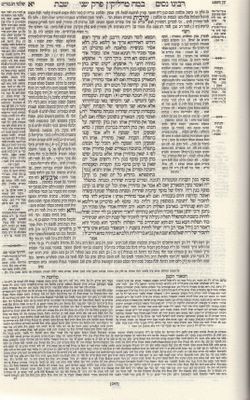
HIDE/SHOW IMAGE
11a
{Shabbat 24 continues}
Should you say that it is unnecessary in the case of Chanukkah, which is only Rabbinical, then on New Moon, which is Biblical, it is necessary; or perhaps since the performance of work is not forbidden, it is not mentioned?
Rav said: he mentions {Rosh Chodesh in Birkat HaMazon}
And Rabbi Chanina said: he does not mention.
Rabbi Zera said: Seize this statement of Rav in your hand, for Rabbi Oshaya taught {in his brayta} like him. For Rabbi Oshaya taught {in a brayta}:
1) On those days when there is an additional {=Mussaf} offering, viz., Rosh Chodesh and Chol HaMoed:What business have Mondays and Thursdays [here]?
during Maariv, Shacharit, and Mincha the Eighteen [Benedictions] are recited, and the nature of the occasion is inserted in the Avodah {that is, Yaaleh VeYavo is inserted in Retzei}, and if one does not insert it, he is turned back {to repeat the passage};
and there is no Sanctification over wine, and mention thereof is made in Birkat HaMazon.
2) On those days when there is no additional offering, such as Chanukka and Purim {the Bach correctly crosses this out - it is evidently so from the Rif's later discussion of Tosefta}, Fast days, Maamadot {'posts': 'a division of popular representatives deputed to accompany the daily services in the Temple with prayers}, Mondays and Thursdays.
Rather [say thus:] on the Mondays, Thursdays and the [following] Mondays of Fasts {that they fasted in times of drought."
and on Maamadot:From this we may deduce that one who errs and does not say Anenu in the prayer {Shemoneh Esrei} of a fast day, that we do not cause him to return. And further we may deduce that one who errs and does not mention Al HaNisim in Shemoneh Esrei on Chanukka and Purim, that we do not cause him to go back, for we only cause him to go back on days that have in them a Mussaf offering, such as Rosh Chodesh and Chol HaMoed, but a day which does not have a Mussaf offering, such as fast days and maamadot, and Chanukka and Purim, we do not cause him to return.
during Maariv, Shacharit, and Mincha the Eighteen [Benedictions] are recited, and the nature of the occasion is inserted in Shomea' Tefillah. And if he did not insert it, we do not cause him to go back,
and they do not have sanctification over a cup, and no reference is made on these [days] in Birkat HaMazon.
And we learn [also] in the Tosefta explicitly, that
Any day that does not have the Mussaf offering, such as fast days, maamadot, Chanukka, and Purim - during Maariv, Shacharit, and Mincha he prays 18 blessings, and mentions the nature of the occasion, and if he does not mention it, we do not cause him to go back.It was a question to them:
And any day that does have the Mussaf offering, such as Rosh Chodesh and Chol HaMoed, during Maariv, Shacharit and Mincha he prays 18 blessings and says the sanctification of the day in the Avodah {Retzei}. And if he did say it we cause him to go back.
Should one refer to Chanukka in Mussaf {on those days that have Mussaf}?
Perhaps since it {Chanukka} does not have a Mussaf we should not mention it, or perhaps it is the day that requires four prayers {and thus, in each prayer, we mention Chanukka}.
Rav Huna and Rav Yehuda say: he does not mention it.
Rav Nachman and Rabbi Yochanan say: he mentions it.
{Shabbat 24b}
And the halacha is like that which Rabbi Yehoshua ben Levi said: When Yom Kippur falls out on Shabbat, he who prays the Ne'ila prayer needs to mention Shabbat - it is the day that requires five prayers. So too here it is the day that requires four prayers, and therefore he mentions it {Chanukka}.
And this that Rav Gidel cited Rav: Rosh Chodesh which falls out on Shabbat, the one who reads the haftarah from Navi need not mention Rosh Chodesh, for if not for Shabbat, there would be no {haftarah from} Navi on Rosh Chodesh -- the halacha is not like him, {as we know} from the statement of Rabbi Yehoshua ben Levi.



No comments:
Post a Comment